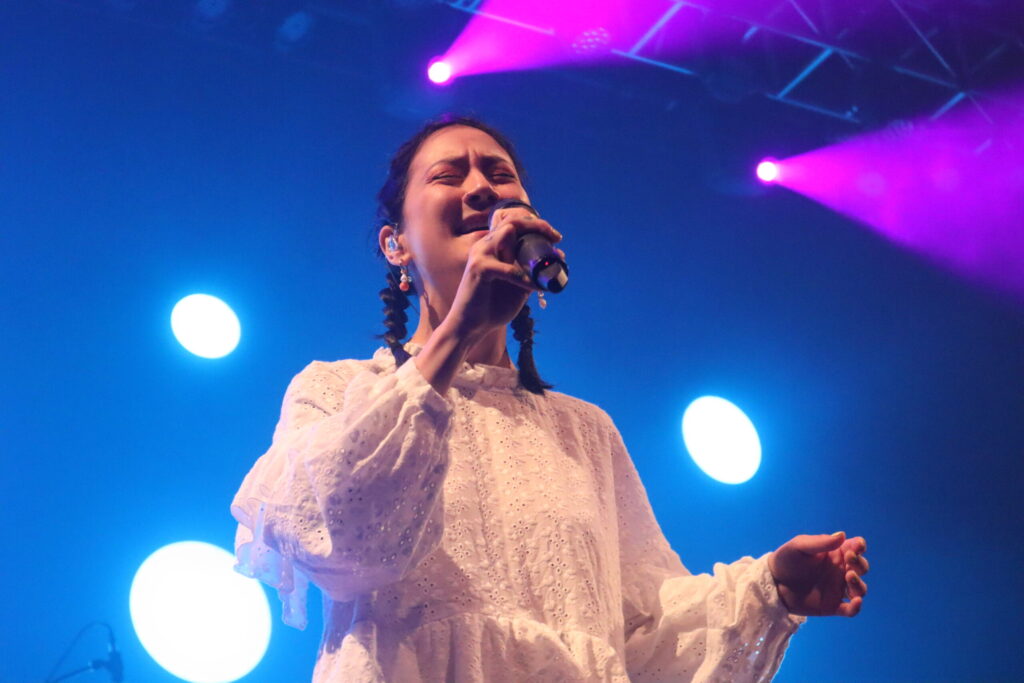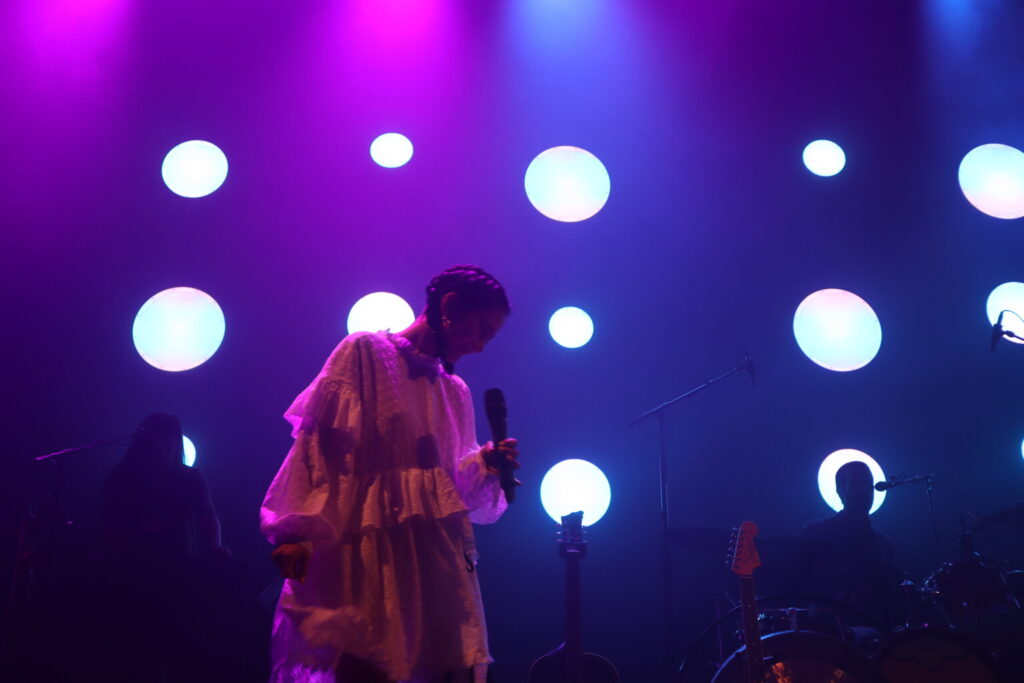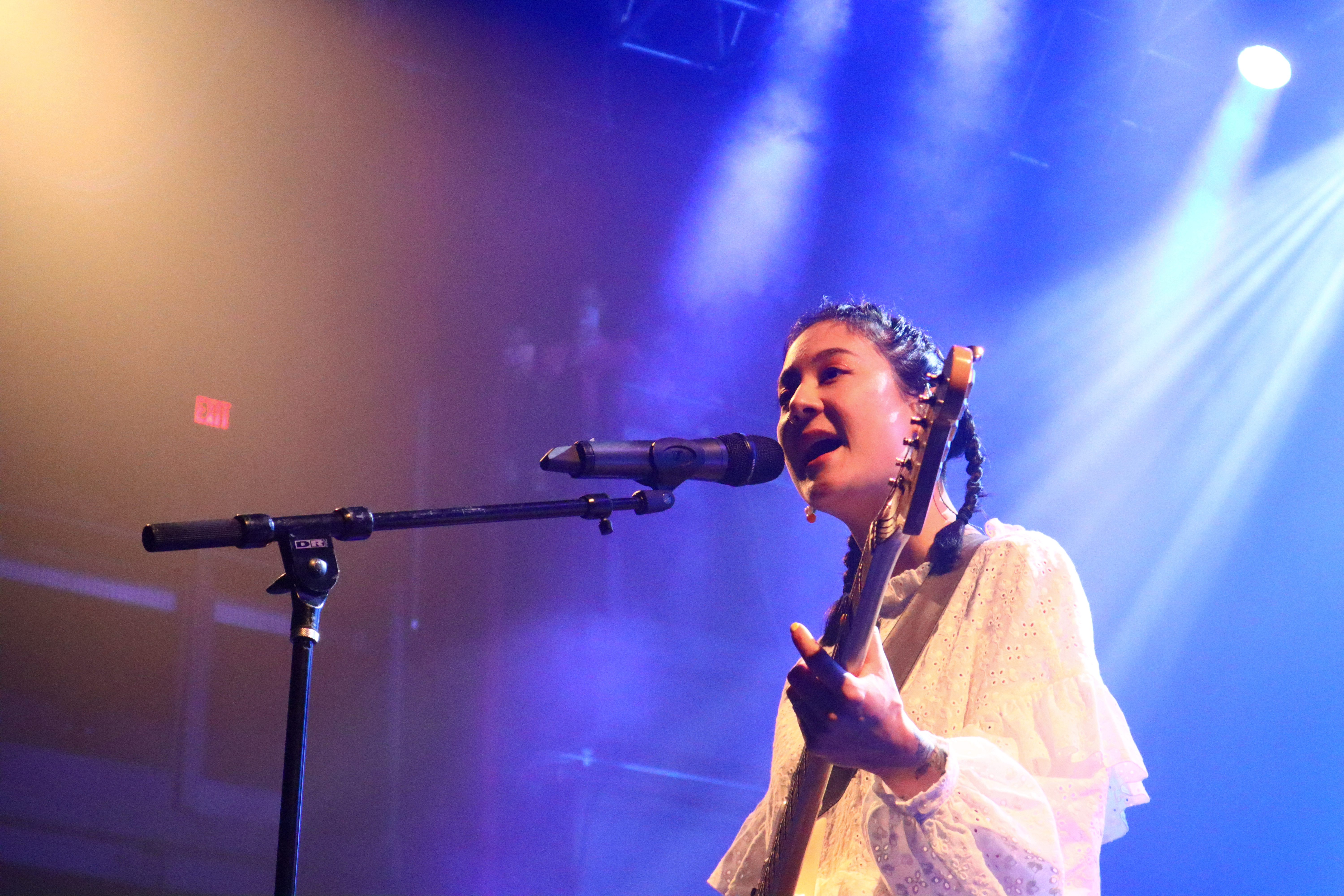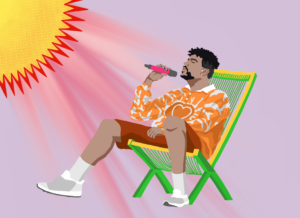Michelle Zauner is at a new height of her powers—and feeling complicated about it. The frontwoman of indie rock band Japanese Breakfast (an ironic moniker, as Zauner is Korean-American) is promoting a new book and album, soundtracking a video game, writing a screenplay, helming a 60-something-date cross-country tour, narrating her own audiobook, and still ( jokingly) considering a public infrastructure project in Philadelphia. How she manages is a mystery to me—and even she approaches this current apex with a bit of hesitation.
“There’s all this expectation when really wonderful things happen to you, that you should feel like the peak of joy, but a lot of the time it’s more complicated than that,” she told me over the phone in July. “When things are going so well, this real fear kicks in that someday you’re going to lose it: If you love someone, you also are filled with this fear sometimes that it’s going to get destroyed by something. Or if you’re at the peak of your career, it can only go down from here.”
It’s this kind of self-aware vulnerability that makes Zauner’s art so special, translating viscerally into an intimacy she sees as a consistent guiding light for her music, writing, and other endeavors. “Radical vulnerability has just felt the most natural to explore creatively,” she said.
And how better to be radically vulnerable than by crying in public? Something about leaping into that visible vat of feeling, knowing there is no telling how onlookers will react, feels revolutionary and, for some, freeing. Indeed, the act of crying in the food court of an Asian supermarket defines Zauner’s sense of catharsis, so much so that it translated into the title of her new memoir Crying in H Mart, as well as the viral New Yorker piece that catalyzed it.
H Mart originally became an emotional ground zero for Zauner after she lost her mother, Chongmi, to pancreatic cancer in 2014. Trawling through the aisles of the Asian supermarket became a homecoming activity of sorts, the aisles of Korean food forming both a link to her past and a reminder of its irretrievability. The small details, like puffy ppeongtwigi, tattooed eyebrows, and QVC-brand facial creams, constitute something of an archive for her—one that unearths memories of her mother.
“Even just hearing the language—hearing Korean—and just little things that remind me of my mother, I can find them there. The same type of sneaker wedge that she would wear that they only sell somewhere,” she said. “Like visors, or the smells and the mannerisms of the people.”
Zauner first discovered H Mart as a personal lightning rod while craving some private time away from her in-laws during the holidays. For the uninitiated, H Mart generally contains a supermarket, a small food court selling overpriced bread and semi-authentic Asian foods, a makeup pop-up, and sometimes a sort of pharmacy. It’s altogether adopted a multi-tool philosophy, which contributes to its appeal.
“I found myself going to H Mart alone for lunch around Christmas Day watching the people there—wondering what they were doing, fascinated by their interior worlds, and found myself just so overcome by emotion of just how much I missed my mother,” she said. “How watching other mothers eat lunch with their children made me feel so jealous and lonely.”
The majority of Crying in H Mart is not really about the grocery, though—the superstructure of food and loss frames a deeper, more nuanced narrative about a mother and daughter, a layered relationship that is not just loving, but truly lovely (a word Chongmi adored). Zauner attempts to reconstruct the wholeness of her mother, a near-impossible task given Chongmi’s protective personal philosophy of concealing at least “10 percent” of herself from view.
A great deal of the book is dedicated to cracking this enigma. As in her music, the most irreverent details become Zauner’s evocative weapons of choice. “When my mom picks a red pepper out of her teeth with a corner of a receipt, I feel like there are people who have seen their mom or someone they love do that, and it shoots you into a moment,” she said. “So much of memory is tied to those details, and ultimately what hits people the hardest.”
These small details translate powerfully in passages where Zauner jockeys to be the caretaker her mother wants. The road is bumpy, though, and Zauner is almost always self-critical along her journey toward healing from such profound loss. Directing the lens at herself paints a complex, flawed, and human picture of her caretaking and grieving in the face of another’s terminal illness.
Often, Zauner’s self-consciousness is tied to the racial and cultural particularities of her upbringing and grieving process. While she was emphatic that the book remains fundamentally a coming-of-age story, Zauner’s lived experience as a mixed-race Korean-American rings clear from page to page. Writing a race-neutral narrative—now, and especially for future fictive endeavors—would abdicate a responsibility to tell her truest story. This obligation created a unique kind of anxiety for Zauner in terms of how Asian audiences might receive Crying in H Mart.
“I didn’t want to pander to a white audience, and that was something that I became preoccupied with at times, but mostly tried to console myself with, How can you be pandering if this is the truth?”
In fact, Zauner noted what she called an “unfair” and “divisive” criticism frequently directed at Asian authors in particular: They supposedly write too much about their mothers, especially when those maternal characters tend to be critical or tough. It’s commentary she’s seen lobbed at her own book—and something she refutes forcefully.
“If we’re pushing to have more inclusivity in the arts, we should be able to write about whatever we want. I don’t understand: What else would I have written about? My mother died. So of course I was going to write about our relationship and what that meant to me,” she said. “And in moments of time I wasn’t allowed to do that, because ‘so much of the Asian-American narrative is focused on the mother,’ was really frustrating for me.”
Even outside the limits of unfair cultural constraint, the process of creation is rarely frictionless and requires tolerance of flaws. “Creating exercises in forgiveness is what is really helpful for me,” she offered. “For a long time, I was writing a thousand words everyday—and a lot of times they were completely nonsensical passages that I would then mine for what was useful.”
Ultimately, though, the book served a singular audience: herself.
“In the case of this book, it was for me and only for me. I had some worries about how it would be perceived, but I ultimately felt like I needed to tell my story.”
The construction of Crying in H Mart took Zauner roughly four years, ideating first in 2016 and emerging with a final draft in the pandemic-addled summer of 2020. Mostly written on laptops and occasionally scrawled in fragments in Moleskines, the book came to be while Zauner was on tour for her first two records. As she transited, she wrote: in the back of a 15-passenger van, in coffee shops between soundcheck and show, and in hotels in Seoul.
In some ways, performing while drafting provided its own form of electricity to light the writing process. “[Touring] also gave me courage in a lot of ways—I was meeting so many mixed-race kids, so many Asian-American kids that I had impacted in a way that made me feel more confident about what I was doing and to press forward.”
An Asian-American kid myself, I felt validated in hearing that there was a mutualistic relationship here—that all the joy I had pulled from her music fed her, too. So when I saw Japanese Breakfast in concert at the Fillmore Silver Spring near D.C. in late July, it was extraordinary to see she still carried this courage.
Zauner charged on stage, radiant, following a neck-breaking opener by punk rock band Mannequin Pussy. Clad in white lace and knee-high black boots, she wailed the chorus of “Paprika,” the first track to their newest record Jubilee (2021). As the pilot show of her first tour since the pandemic began, the Fillmore concert opened with a marked sense of urgency, a feeling of, Let’s make the most of what we have…while we have it.
It was my first concert, too, in 509 days—so I felt the same desperation, masked amongst a crowd of about a thousand (mostly vaccinated) strangers. Earplugs wormed into ear canal, clear vinyl tote bag, and a kindhearted friend in tow, I closed my eyes and shimmied in place to the sound of Zauner unwrapping Jubilee to a crowd of fans for the first time.
 Photo by Max Zhang
Photo by Max Zhang
At its core, Jubilee is a record exalting the most earnest forms of love: a vulnerable spouse waiting for their partner to come home (“Posing in Bondage”), a naïve goodbye between teenage sweethearts (“Kokomo, IN”), a breadwinner courting a lover in the midst of apocalypse (“Savage Good Boy”). Most of the album aspires towards joy, a radical move in the landscape of indie rock songs about toxic relationships and societal anxieties.
“The theme [of Jubilee] was always a very broad theme, I felt. Songs about people struggling to feel joy or relearning how to feel joy—permitting themselves to feel joy— sustaining joy,” Zauner said. “I think they all interact with joy in one way or another. That was what linked them.”
Indeed, Jubilee marks a major departure from the band’s first two, grief-stricken records, Psychopomp (2016) and Soft Sounds from Another Planet (2017). They mull over wounds, fearlessly tearing the bandage off without much hoping for better. Jubilee, on the other hand, is committed to healing: When the album does acknowledge a broken body, it’s the brain wrestling for happiness (“Slide Tackle”) or the heart becoming whole (“Posing for Cars”).
Hearing the album live—the saxophone so warm, the percussion so vibrant—was a distinct experience from walking alone down Wisconsin Avenue, headphones clamped on, to the woozy guitars on “Sit.” The latter makes Jubilee a soundtrack; the former transforms it into a centerpiece, a motion, a celebration. More than anything, being in a packed theater (COVID-19 anxieties aside) and watching the crowd rave about a self-made artist pushed a small pride through my veins: Look! Somebody made it.
Before mainstream success with Japanese Breakfast, Zauner spent several years taking odd jobs to pay the bills while playing basement gigs. “I had fought for that dream thanklessly for eight long years, and only after [my mother] died did things, as if magically, begin to happen,” she writes in Crying in H Mart. Psychopomp, serendipitously, gained critical and popular traction upon release in 2016, leading to an opener spot for Mitski’s tour and a Dead Oceans label signing shortly after. To see Zauner’s “pipe dreams” (as she terms them) come true in real time felt special, and most importantly, encouraging.
“I came from an immigrant parent who really warned me against this lifestyle, so I was always pursuing a safe bet in addition to my creative path. I think ultimately that was what made me realize it was truly meant to be, because I kept at it even after going to college,” she said. “Even after working jobs, it was always something that I was doing.”
When I prodded her about the tension between traditional careerism and unfettered artistry, she was unwavering: “It is possible to pursue both in a way. If it’s persistently calling to you, you can find a way to always work at it.”
 Photo by Max Zhang
Photo by Max Zhang
Perhaps it was revealing, then, that our interview had to end abruptly, as she was pulled away for soundcheck: That night in New Haven, she opened alongside Lucy Dacus for indie rock paragons Bright Eyes, who were a show into their first tour in a decade. It was a good preview of the coming months, when Zauner will be awfully busy, even in the rest period between the American and European legs of her tour. Variety reported in early June that Crying In H Mart has been acquired by MGM label Orion Pictures to be adapted into a feature film, for which Zauner will write the screenplay and the soundtrack. That’s in addition to the medley of other projects she is attached to, some of which are likely still invisible to the public.
And, among all of these undertakings, what is she dreaming of? “A day when it doesn’t always feel like we’re on the verge of the end of the world,” Zauner wrote to me late August via her publicist. “That, and a long period of time to just chill and work on my art.”
In the face of this uncertain future, I am confident we will be lingering onto her every jubilant word.







